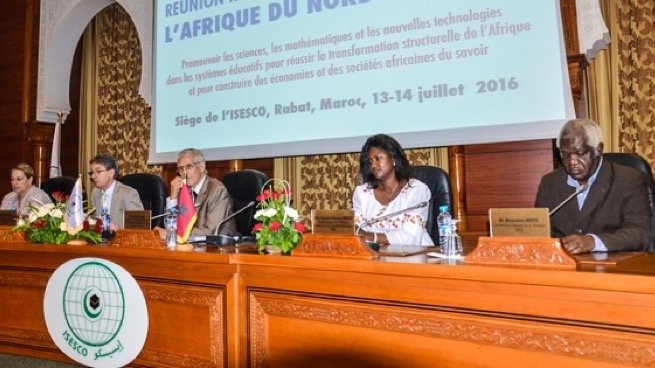Regional consultation for North Africa region underscores the importance of Science, Mathematics, and ICT in Africa

Abidjan, 22 July 2016 – The Kingdom of Morocco has just hosted the third regional consultation – in the framework of preparations for the 2017 Triennale of the Association for the Development of Education in Africa (ADEA) – for the North Africa region on 13-14 July in Rabat, after those respectively held on 30-31 May in Gabon for Central Africa on Sub-theme No. 4 of the Triennale relating to the promotion of peace and world citizenship through education, and in Senegal on 13-14 June 2016 in Dakar for the West Africa region on Sub-theme No. 2 relating to the promotion of science, mathematics, and ICT in education to succeed in undertaking the structural transformation of Africa and in building knowledge-based African economies and societies.
The Rabat consultation, which was organized under the leadership of Morocco’s Ministry of Higher Education, Scientific Research and Training in close collaboration with the Islamic Educational, Scientific and Cultural Organization (ISESCO), the African Development Bank Group (AfDB), and the Japan International Cooperation Agency (JICA), was attended by experts from Kenya, Mauritania, Morocco,, and Tunisia on Sub-theme No. 2 of the Triennale. It was chaired by H.E. Lahcen Daoudi, Morocco’s Minister of Higher Education, Scientific Research and Training, who, in his opening remark, underscored the urgency for African countries to bridge the existing gap between Africa and other countries of the world in the areas of Science, Mathematics, and Technology. Min. Daoudi also drew the attention of participants to the need for Africa to take into account the dimension of the integration of mother tongues in the teaching of science and mathematics because developing the objectives of the 2030 Global Agenda as well as those relating to Africa’s Agenda 2063 depend on the capacity of the African continent to benefit from its linguistic heritage. Lastly, H.E. Daoudi recalled that ADEA’s choice to host the 2017 Triennale in the Kingdom of Morocco is not fortuitous because the Al Quaraouiyine University in Fez, built in 859 during the reign of the Iddrisside dynasty, is today considered the oldest university still in activity in the world, which witnessed the emergence of the greatest Arab philosophers such as Averroes (Ibn Rochd), Avempace (Ibn Baja), or Ibn Khaldoun.
In his welcome remark, Mr. Najib Rhiati, Supervisor with ISESCO HQs, recalled the importance for the various education stakeholders to work together. Mr. Rhiati underscored that the conclusions and recommendations of the conference will enable ISESCO to readjust its activities, from an institutional perspective, through the conference of Ministers of Education of the Islamic world.
Meanwhile, Ms. Leila Jaffor, education specialist of the African Development Bank Office in Morocco, highlighted the importance which AfDB gives to the promotion of science, mathematics, and technologies as shown by the US$ 900 million (2010-2016) assistance provided to African countries aimed at improving higher education, science, and technology in Africa, as well as developing youths’ skills in the areas of science, technologies, and innovation.
Speaking on behalf of Ms. Oley Dibba-Wadda, ADEA Executive Secretary, Ms. Ramata Almamy Mbaye, Senior External Relations and Strategic Partnership officer, reiterated that ADEA regional consultation for the North Africa region is the first major meeting organized in Morocco prior to the Triennale, scheduled for Marrakech on 15, 16, and 17 March 2017, and that the combination of invaluable efforts provided by the Moroccan authorities and the ADEA’s strategic partners including AfDB, ISESCO, JICA, and the Education Ministries of invited countries, were arguments in favour of a high-level Triennale which also demonstrate the level of ownership by the countries of the Marrakech event.
According to Mr. Mamadou Ndoye, General Coordinator of the 2017 Triennale, there are transition periods in the history of humanity that offer exceptional opportunities, which no one can afford to miss as such Africa’s demographic bonus that has a greater active population than its dependent one.
According to Dr. Grace Orado, the science expert representing the sub-theme coordinator from ADEA’s Inter-Country Quality Node on Mathematics and Sciences Education (ICQN-MSE),this regional consultation offered not only a platform to all participants for sharing lessons learnt, good practices, and successful innovations in Africa and elsewhere, it also explored strategies for addressing the challenges identified and being able to “re-create,” within specific contexts, the conditions and factors for building successful knowledge-based African economies and societies.
The Secretary-General of the Ministry of Higher Education, Scientific Research, and the Training of Morocco chaired the closing ceremony and commended the success of this joint collaboration with ADEA, which the Kingdom of Morocco hopes would endure and be sustained.
Mr. Atsushi Matachi, on behalf of JICA, highlighted the importance of this platform of knowledge and experience sharing that ADEA provides to education stakeholders, and in that perspective, the Japan International Cooperation Agency has contributed in sharing the experience of the scientific and social culture Japan has so well combined in over 25 African countries to boost the capacities of children and the youth in science, mathematics, and ICT.
Mr. Skander Ghenia, the Director-General of the Computer and Electronic Administration Department of the Ministry of Education of the Republic of Tunisia, and also in his capacity as the representative of participants, opened his message congratulating ADEA for the spirit of collaboration that gives so much hope for the success of the 2017 Triennale.
Lastly, Mr. Najib Rhiati, as representative of ISESCO’s Director-General, warmly thanked ADEA for the consistency of its contribution to the development of Africa through education and training.

